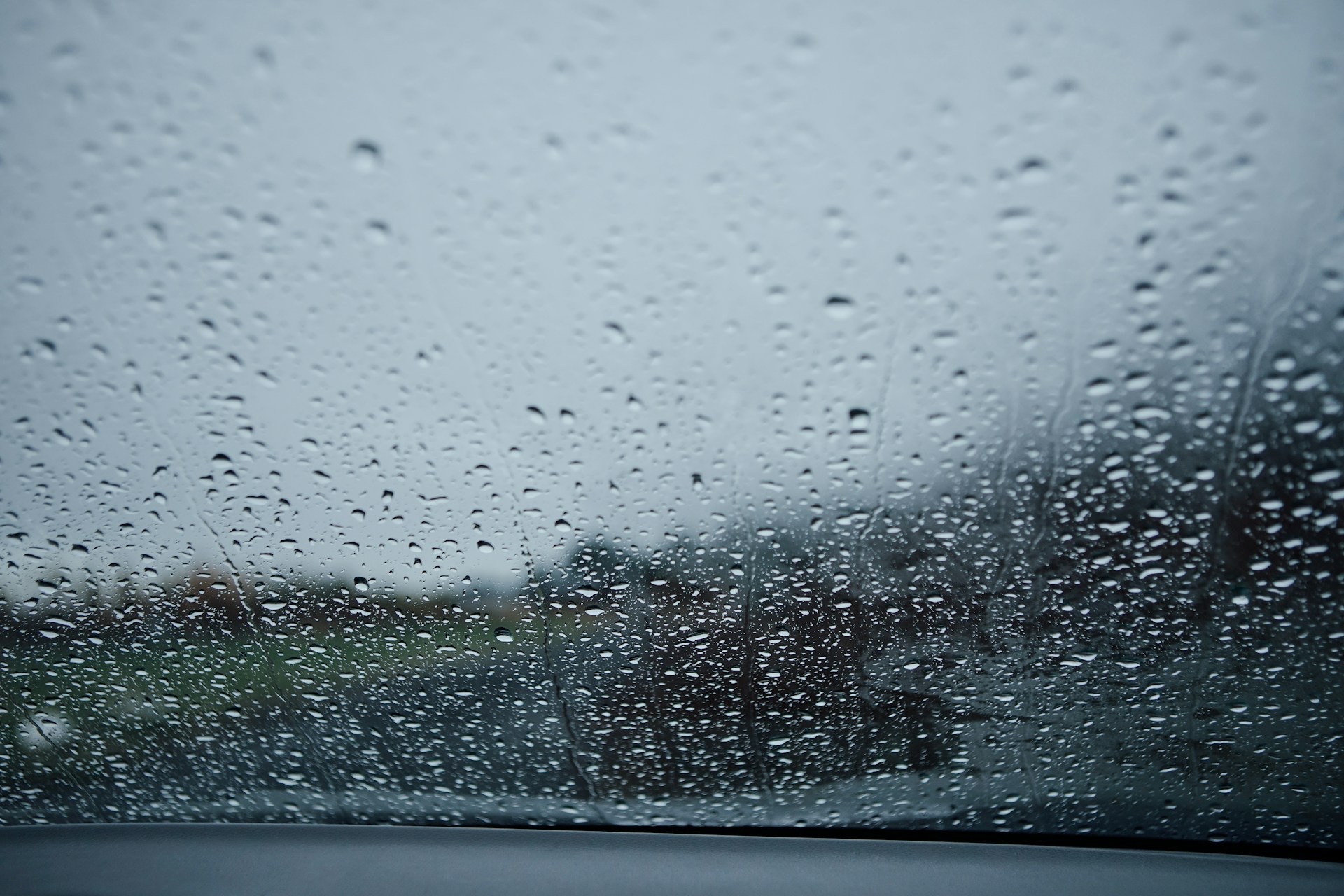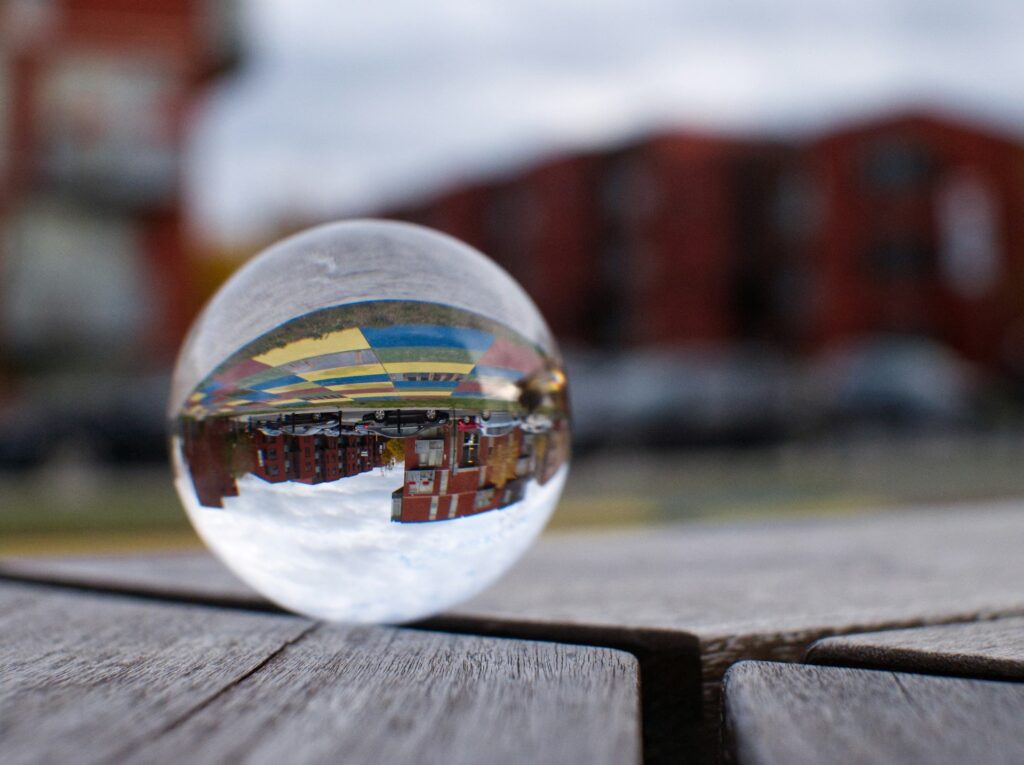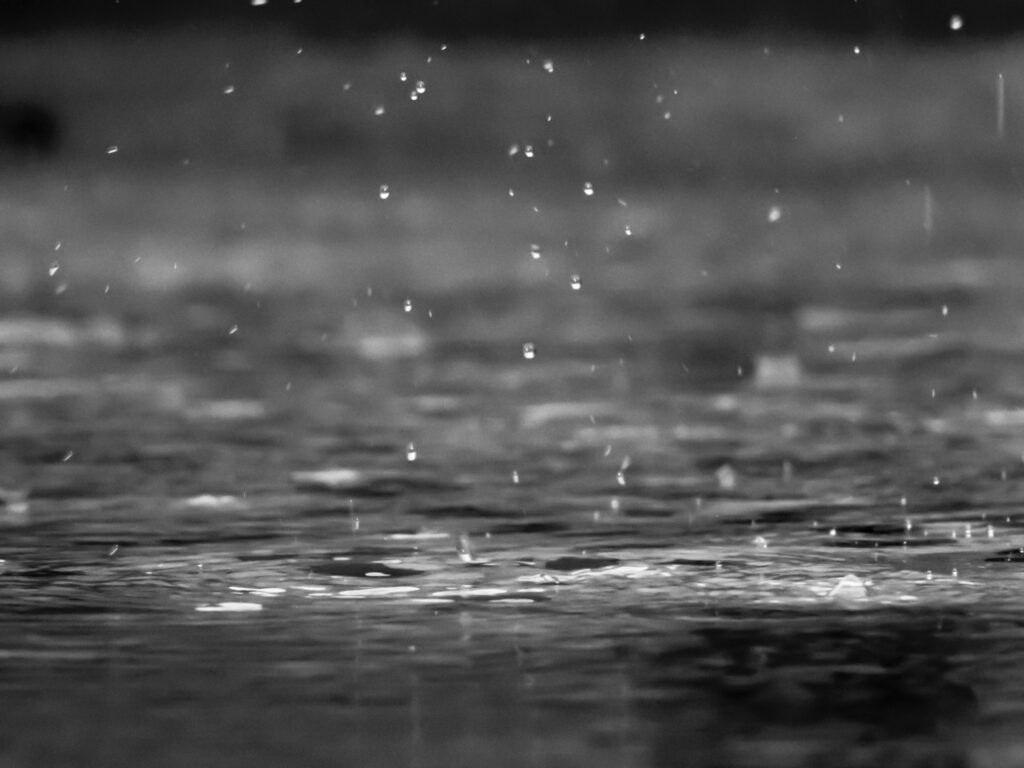Raindrops, reality, and not-self

I had half an hour to kill today waiting for a CT scan, and I decided to do a 15-minute mindfulness meditation in the car. It started raining right as I began the meditation, and I gazed at the raindrops falling on the windshield, allowing them to be the object of my meditation. I’ve never looked at raindrops so closely in my life, and I observed some interesting characteristics about them.
Each drop contains a tiny, distorted image of reality
Looking at the detail of each individual drop, I realized they all contained a similar, tiny image: the image of what was on the other side of the windshield. The image was upside down, and it was slightly different in each drop. It was bigger in the big drops, smaller in the small drops, and distorted in the odd-shaped drops, but it was the same general image in all the drops.
I recommend trying this when you get a chance: look very closely at each droplet on your windshield and try to see the image it’s projecting to you. I mean, it’s straightforward and intuitive that the droplets behave this way, but it’s incredible to see it in real life. I can’t believe I had never looked at raindrops in this way.

The images in the drops made me think about reality, and how none of us has a perfect conception of it. It’s as if each of us has our own droplet we’re looking through, and the image is similar enough between them all that we can cooperate using a shared mental model of reality. Yet, at the same time, the images are all slightly different, and they’re all “wrong.” Or are they all “right”?
This inability of ours to clearly see reality reminds me of an ancient parable called “The Blind Men and the Elephant.” Here’s a poetic version of it, written by John Godfrey Saxe:
(Credit to Noah Rasheta for sharing this on his Secular Buddhism podcast)
It was six men of Indostan To learning much inclined, Who went to see the Elephant (Though all of them were blind), That each by observation Might satisfy his mind. The First approached the Elephant, And happening to fall Against his broad and sturdy side, At once began to bawl: "God bless me!—but the Elephant Is very like a wall!" The Second, feeling of the tusk, Cried: "Ho!—what have we here So very round and smooth and sharp? To me 't is mighty clear This wonder of an Elephant Is very like a spear!" The Third approached the animal, And happening to take The squirming trunk within his hands, Thus boldly up and spake: "I see," quoth he, "the Elephant Is very like a snake!" The Fourth reached out his eager hand, And felt about the knee. "What most this wondrous beast is like Is mighty plain," quoth he; "'T is clear enough the Elephant Is very like a tree!" The Fifth, who chanced to touch the ear, Said: "E'en the blindest man Can tell what this resembles most; Deny the fact who can, This marvel of an Elephant Is very like a fan!" The Sixth no sooner had begun About the beast to grope, Than, seizing on the swinging tail That fell within his scope, "I see," quoth he, "the Elephant Is very like a rope!" And so these men of Indostan Disputed loud and long, Each in his own opinion Exceeding stiff and strong, Though each was partly in the right, And all were in the wrong! So, oft in theologic wars The disputants, I ween, Rail on in utter ignorance Of what each other mean, And prate about an Elephant Not one of them has seen!John Godfrey Saxe
Each drop is separate, but it’s all “just water” (not-self)
As I’ve studied Buddhism, the concept that has been the hardest for me to grasp is not-self. I don’t know if it’s because Western culture is so focused on individualism or what, but not-self is a struggle for me. That said, I think the raindrops gave me a slightly better understanding of it, and it has to do with the water cycle.
I remember learning about the water cycle in grade school:
- Evaporation. Water evaporates from oceans, lakes, plants, and anywhere, really. Since water vapor is less dense than atmospheric molecules, it rises above them.
- Condensation. The vapor rises to high altitudes and the temperature drops, causing the molecules to condense into droplets.
- Precipitation. The droplets are now denser than air molecules, so they fall back to the ground.
As I sat there in the driver’s seat watching raindrops land on the windshield, I thought about where each raindrop came from, and where it would end up. The drops came from a cloud hovering over the Ogden area. The cloud formed from water vapor that evaporated from somewhere—maybe the Pacific Ocean or a nearby lake.
After the drops landed on my windshield, they ran down the glass, colliding and combining with other drops along the way. They made their way from my car down to the parking lot pavement, combining with other drops to form puddles and little streams in gutters. Some of the water might stay there in puddles, and some might make its way to storm drains, leading to who-knows-where. And then eventually the water molecules will evaporate again.
As I thought through this “life of a raindrop” journey, I made an observation that helped me understand not-self just a little bit better. And that is that a raindrop is a raindrop only for a brief moment. Before and after that, it’s just water.
Calling it a raindrop only makes sense while it’s actually falling. It’s impossible to say that “this raindrop came from the Great Salt Lake,” or “that raindrop will end up in the Colorado River,” because as soon as it hits the ground, it’s no longer a self contained unit. It’s just water, mixed in with all the other water.

I’ve heard secular Buddhists talk about death in this way. Because everything is one, we aren’t “gone” when we die, we’re still just part of everything.
We were part of everything before we were born, just like the raindrop was part of all the water before it fell from the sky.
We’re part of everything while we’re alive, just like the raindrop, while falling, is part of all the water.
We’ll be part of everything after we die, just like the raindrop, after it’s no longer a raindrop, is still part of all the water.
So, while it makes sense to refer to raindrops as raindrops, just like it makes sense to refer to ourselves as “self,” it also makes sense in a larger, more timeless context, to call raindrops water, and to call ourselves “everything.”